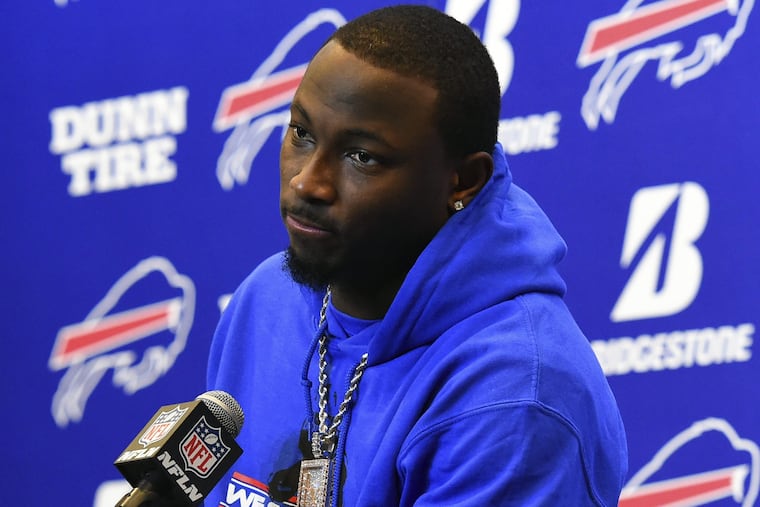Since I was asked: LeSean McCoy handled his issues with me aggressively | Marcus Hayes
When a radio host asked about McCoy's character, Marcus Hayes recounted two disturbing incidents in his experience with the controversial former Eagles running back.

Sometimes, you write a column because you believe you have to, not because you want to. This is one of those times.
LeSean McCoy has been connected with yet another unsavory incident. Coincidentally, on Wednesday morning, WIP-FM had scheduled a call-in interview with me about an unrelated topic: the Sixers' devotion to and development of sports science.
However, the host, Angelo Cataldi, knew I covered McCoy extensively while McCoy was a Pro Bowl running back for the Eagles. Before I came on the show, the topic had been the endorsement of McCoy by current Bills teammate Richie Incognito and the value of such an endorsement from a person like Incognito. Then I was asked what I had observed about McCoy's character. I related the following stories, which I had never publicly discussed before.
In 2010, as I sat in the makeup chair in the green room of the local television studio with a barber's cape around my neck, McCoy and one of his associates were collecting their coats to leave. He'd been a guest on a show that preceded mine and had just finished his second season with the Eagles, in which he gained 1,080 yards in 15 games. He took that opportunity to remind me of something I'd written after his rookie season, in which I'd characterized him as something other than the world's greatest young running back. As a rookie, McCoy, a second-round pick, shared the starting role with two other running backs. My characterization was accurate at the time, but I congratulated him on the progress he'd made in the year since.
>> READ MORE: What we know about the LeSean McCoy domestic abuse allegations
He replied with a loud string of expletives. He impugned my professionalism, my acumen, and my intelligence … and then he stuck his finger in my face and told me he should kick my "[bleeping] ass."
I removed the cape, got out of the chair and reported his words and threats to the station manager, who told me to stay put and went to the green room. I returned to the green room a few minutes later. McCoy was gone.
About a year later, in the locker room while I was waiting to interview another player, McCoy called me over to his locker. Asante Samuel, his good friend, stood next to him. There, McCoy began to deride me again for a subsequent story. I told him I had no interest in having that conversation in that space. At that point, Samuel grabbed me by the arm to hold me in place.
Samuel was unable to hold me in place, and my virulent objection to him touching me at all caused the public relations staff to intervene.
Neither of these incidents is offered as evidence that McCoy had any involvement with the alleged crime committed in Georgia, where his former girlfriend was assaulted.
Neither of these incidents affected McCoy's performance on the field. That's why I've never discussed them before.
But these incidents, combined with others in McCoy's past, paint the picture of, at the very least, a man who struggles to resolve conflict with civility. He has been connected with a nightclub brawl, kicking a female guest off a party bus on the New Jersey Turnpike and, frivolously, tipping badly.
I was asked for my personal experiences in relation to his character. I responded honestly.
He is not the only athlete or member of team personnel with whom I have had conflict. Incidents like these are not uncommon for beat writers or columnists who essentially are embedded in the team's routine.
I've been in the business for 28 years and have experienced seven other incidents that escalated past normal conversation: two with baseball players, one with an NBA player, one with an NFL player, one with a football general manager, one with a baseball general manager and one, 20 years ago, with a media relations director.
None involved physical threats or physical contact.
Writers receive most complaints from players and front-office types without much conflict. Once, a Phillies outfielder took issue with how I described a play he made in the field: I said he misplayed it, while he contended he made the correct play, which was a more difficult play but, considering the situation in the game, he believed it was worth the risk. I agreed and corrected my story the next day. His explanation actually changed how I regarded athletes' strategies and performance.
Certainly, not every athlete is equally evolved. Not every person handles frustration or conflict the same way. In my experience, McCoy was unusually aggressive.
Again: This is not meant to convict McCoy in the court of public opinion for either his latest situation or for any of his previous situations. I addressed it in this space only because I addressed it on a radio show, and then after I was asked to do so.
I have no regrets about what I said on the show, but it precipitated this column. The sort of column you never want to write.
Sometimes, you have little choice.